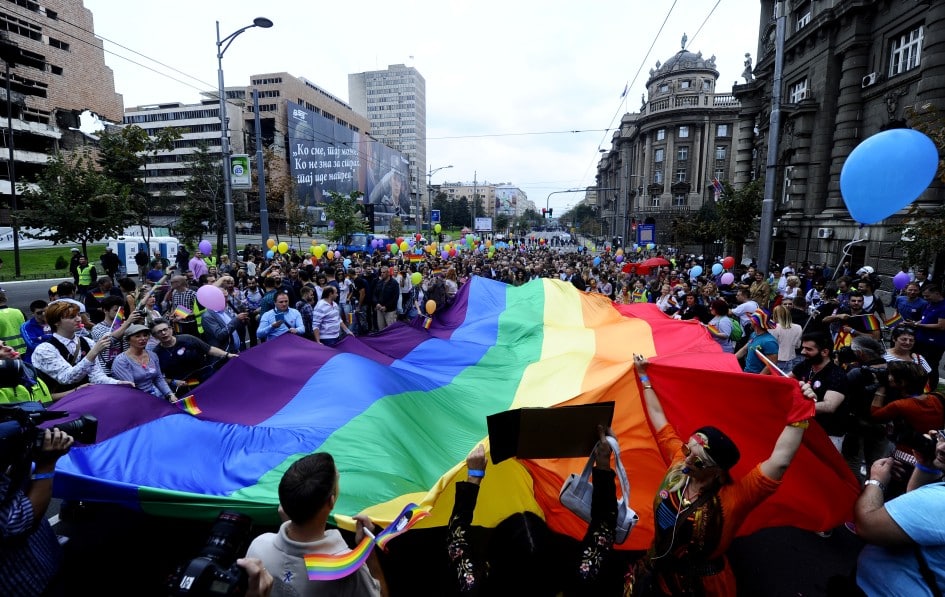Belgrade Pride, 2015 (Source: Wikimedia)
In 2019, it was announced with great excitement that Belgrade would be selected to host EuroPride in 2022. Kristine Garina, the president of the European Pride Organisers Association, stated that the election of a EuroPride in Belgrade is a sign that the event wants to have maximum impact on the rights of the LGBTI+ community. Given this unique opportunity to hold the EuroPride for the first time in South Eastern Europe, Serbian President Aleksander Vučić’s decision to cancel the event under pressure from the Serbian Orthodox Church, and far-right and nationalist groups led to fierce criticism from EuroPride, human rights organisations and supporters of LGBTI+ rights in Serbia.
Pressure on LGBTI+ rights in Serbia
Given the history of organising a LGBTI+ pride parade in Belgrade, which has been greeted with counter-protests and violence from religious, far-right and nationalist groups since its first attempt in 2001, it was not unexpected that Belgrade’s selection led to criticism from these parts of society. On the 28th of August 2022, a few weeks before the planned date of the event, demonstrations against EuroPride were organised by the Serbian Orthodox Church and joined by nationalist groups to ‘save Serbia’.
Serbia has a long history of continued pressure on LGBTI+ rights, despite modest improvements in recent decades. For instance, the birth of the son of openly gay Serbian Prime Minister Ana Brnabic and her partner was initially hailed as a historic milestone for LGBTI rights in the country. However, a ban soon followed, blocking the path to parenthood for same-sex couples. In 2019, when the Belgrade Pride could take place, people marched under the slogan ‘Ne odričem se’ (I’m not giving up) to address their demands for improved LGBTI+ rights and their disapproval of the widespread discrimination that is faced by the LGBTI+ community.
The anti-LGBTI+ movement in Serbia calls itself ‘pro-family’. As arguments against equal rights for the LGBTI+ community, the movement principally argues that homosexuality is a danger for Serbian society, culture and traditional values. An extension of the movement is also a nationalist anti-Western message that Bosko Obradovic, leader of the right-wing opposition party Dveri, describes on Twitter as: “Not only against Euro-NATO-Pride, but also in support of Russia and the preservation of Kosovo and Metohija as part of Serbia. A new patriotic (op)position has been born and is yet to come.”
In addition to all right-wing parties in Serbia condemning the organisation of EuroPride in Belgrade, Bishop Nikanor of the Serbian Orthodox Church vilified supporters of LGBTI+ rights further by saying: “I will curse all those who organise and participate in something like that, I can do that much. If I had a weapon, I would use it, I would use that force if only I had it, but I do not.” The comments by Bishop Nikanor were frowned upon by Vučić himself, who said that his remarks were a humiliation for both himself and the church.
Cancellation decision is unjustified
The day before the ‘pro-family’ protest in Belgrade, Vučić decided that EuroPride would not take place in September. In his explanation, he pointed to tensions between Serbia and Kosovo as a cause for the cancellation. In addition, Vučić said that it was a difficult decision “because I am not very happy to jeopardise the rights of a minority”. He further denied allegations that the decision was taken following increasing pressure from the Serbian Orthodox Church and opposing parts of society.
Human Rights Watch has strongly criticised Vučić’s decision and believes that the safety and dignity of EuroPride participants should be safeguarded. The right to assemble safely and stand up for equal rights is being violated by the Serbian Government by cancelling the EuroPride. The fact that the tensions between Serbia and Kosovo are the reason for the ban, and that the organisation of EuroPride would put an overwhelming pressure on the state has ultimately everything to do with the event’s opponents.
Vučić states that Serbia cannot protect minority rights due to the current problems and pressures on the state. He fears that opponents could misuse the event, which would impact stability, the safety of participants and the willingness to participate similar events in the future. However, this argument is at odds with the country’s promise to protect LGBTI+ rights, which are part of Serbia’s route to EU membership. By cancelling the event, Vučić is not only showing that EuroPride’s opponents are prevailing in the issue of LGBTI+ rights within Serbia, but at the same time shows that Serbia fails to deliver on its promises to improve LGBTI+ rights, and violates fundamental human rights as defined by the European Court of Human Rights to hold the LGBTI+ pride parade. In essence, cancelling EuroPride is a step in the opposite direction of European rapprochement by Serbia.
Continuation of EuroPride
Despite the cancellation of the event by Vučić, the organisation of EuroPride has vowed that it will be held regardless of the president’s decision. It puts Vučić’s government on the spot, considering the earlier indication that safety around EuroPride cannot be guaranteed. Vučić’s dilemma is one of continuously balancing between keeping both the opponents of LGBTI+ rights, including the influential Serbian Orthodox Church, and the advocates of LGBTI+ rights pleased. By cancelling the EuroPride, he has, for the time being, clearly chosen the first group. With the anticipated skirmishes in the continuation of the banned EuroPride event, a solution that protects the participants is anxiously awaited.
Author: Mathieu Neelen
Sources: Balkaninsight, EuropeanPride, Euronews1, Euronews2, Euronews3, Human Rights Watch, Politico, RadioFreeEurope
Photo: Wikimedia



